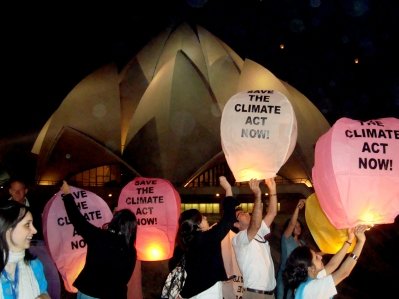Climate ethics is talking point at Copenhagen conference
17 December 2009
COPENHAGEN, Denmark — Acceptance of the ethical dimension of climate change has risen to a new level of importance in discussions at the UN Climate Change Conference in Copenhagen, say members of the Baha'i delegation.
"It is no longer just a small group that is talking about the moral and ethical dimensions of the issue – these ideas are becoming part of the discourse at Copenhagen," said Duncan Hanks, executive director of the Canadian Baha'i International Development Agency.
"We hear it from people at the podium, in discussions in the hallways, and we see it on banners saying things like 'Climate justice now,'" he said.
Peter Adriance, another member of the Baha'i delegation, said the focus on ethics and justice has also helped bring about a realization on the part of many at Copenhagen that climate change must be considered beyond the bounds of domestic politics.
"The local and national and the international are very much linked on the climate issue," he said. "If a representative of a country says 'I am not going to take measures to reduce carbon emissions because it is going to hurt the economy,' more and more people are asking the logical question: 'Then, does that mean you don't have obligations outside your border?' So the whole discourse on climate ethics is calling attention to the international obligations that nations have towards each other."
The UN conference aims to strike a new international agreement to reduce global emission of carbon dioxide and other greenhouse gases. Such a pact would succeed the Kyoto Protocol, which expires in 2012.
In addition to government leaders and negotiators from 192 countries, the conference has drawn participants from international agencies, the news media, and a diverse sampling of other organizations, ranging from environmental groups to corporations.
The delegation of the Baha'i International Community, registered with the United Nations as an international nongovernmental organization, comprises some 20 people.
Tahirih Naylor, a Baha'i representative to the UN, said many of the difficulties encountered during the conference have served to highlight the need for international cooperation to protect the environment.
"Tackling climate change requires concern for the welfare of all humanity over self-interested nationalism," she said. "The findings of science should not be distorted to serve political ends. Whatever disagreements there may be on the causes of climate change, it is clear that protecting our environment should be viewed not only in technical and economic terms, but also as a moral and ethical challenge for the whole world."
She agreed that statements by government leaders, civil society representatives, and others have begun increasingly to make reference to the importance of justice and morality in dealing with the issues of environmental protection.
At a press conference last week on the Interfaith Declaration on Climate Change, held as part of the Copenhagen event, Ms. Naylor said that it is "critical for the religions to come together around this issue, to call for action from the leaders of the world, and also to take action within our own communities."
"We feel that climate change is challenging humanity to rise to the next level of our collective maturity, a maturity which calls us to accept our fundamental unity, the fact that we are all one people living on one finite planet, that we are all brothers and sisters," she said.
"We recognize that the quest for climate justice is not a competition for limited resources," she said, "but part of an unfolding process toward greater degrees of unity among nations. ..."
__________________
Reprinted with permission from the Bahá'í World News Service.

